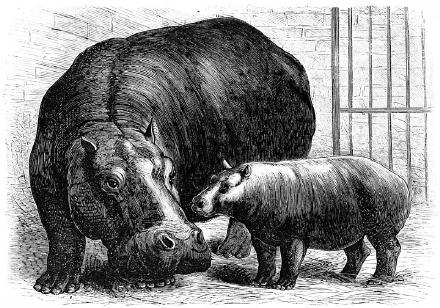Summary | Excerpt | Reviews | Beyond the Book | Read-Alikes | Genres & Themes | Author Bio

A Novel
by Yoko OgawaThis article relates to Mina's Matchbox
In Mina's Matchbox, a book filled with quirky characters, Yōko Ogawa introduces one of her most memorable creations yet: Pochiko, a 35-year-old pygmy hippopotamus. Flying in the face of the species' reputation as aggressors, Pochiko has a sweet temperament, charming the novel's protagonist and the readers alike. But she is far from the first hippo to beguile readers.
There have, unsurprisingly, been many children's books to feature hippos: Hippos Go Berserk! by Sandra Boynton, The Hiccupotamus by Aaron Zenz, George and Martha by James Marshall, The Truth About Hippos by Maxwell Eaton III, and more. But hippos have also been featured in books, poems, and short stories for adult readers.
Frank L. Baum's 1901 short story collection American Fairy Tales features a story called "The Laughing Hippopotamus." The book is a collection of twelve fantasy stories, and "The Laughing Hippopotamus" introduces an aristocratic family of hippos who live on the Congo River and exist in a state of warfare with the locals, who try to capture and eat them.
"The Hippopotamus" by T.S. Eliot, published in 1919, is a poem that satirically compares the Christian Church to a hippopotamus, contrasting a hippo's weak and clumsy reputation with that of the Church's strong and sturdy one. Also contrasting the innocence of the animal with the corruption of the Church, Eliot's poem is a reflection of his growing disillusionment with religion after the First World War.
Originally published in Spanish in 2011, The Sound of Things Falling by Colombian author Juan Gabriel Vásquez is the fictional story of a law professor's experience with the drug wars of 1990s Bogotá. The novel opens with the fatal shooting of a hippo that had escaped a zoo owned by drug kingpin Pablo Escobar, and the hippo serves as a lynchpin for the narrator to reflect on the state of the country during Escobar's reign of terror.
Much nonfiction has also been written about hippos. In 1910, in the midst of a national meat shortage, a U.S. bill proposed a mass import of hippopotamuses to be served up as "lake cow bacon." While the "American Hippo Bill" was rejected, this strange piece of history lives on in "American Hippopotamus" by Jon Mooallem, a longform piece of nonfiction that does a deep-dive into the campaign to bring hippo meat to the U.S.
 A Hippo Love Story is a memoir that chronicles a series of events in 1992, when Karen Paolillo joined her geologist husband in a remote bush camp in Zimbabwe during an extreme drought. Encountering a group of hippos on the brink of death as their water source, the Turgwe River, had dried up, Paolillo worked with the British charity Care for the Wild International to raise thousands of pounds in order to give them an artificial water source. Paolillo and her husband still live with hippos today, in an area called the Save Valley Conservancy, where she has formed the Turgwe Hippo Trust.
A Hippo Love Story is a memoir that chronicles a series of events in 1992, when Karen Paolillo joined her geologist husband in a remote bush camp in Zimbabwe during an extreme drought. Encountering a group of hippos on the brink of death as their water source, the Turgwe River, had dried up, Paolillo worked with the British charity Care for the Wild International to raise thousands of pounds in order to give them an artificial water source. Paolillo and her husband still live with hippos today, in an area called the Save Valley Conservancy, where she has formed the Turgwe Hippo Trust.
And yet perhaps the most famous hippo book of all, And the Hippos Were Boiled in Their Tanks by Jack Kerouac and William S. Burroughs, does not contain a hippopotamus in its pages. Though there is some dispute about where the phrase originated, Burroughs claims that he heard a radio announcer say the line during a broadcast about a circus fire. The novel itself is based on the killing of David Kammerer by Lucien Carr, both acquaintances of Kerouac and Burroughs.
Filed under Books and Authors
![]() This article relates to Mina's Matchbox.
It first ran in the August 21, 2024
issue of BookBrowse Recommends.
This article relates to Mina's Matchbox.
It first ran in the August 21, 2024
issue of BookBrowse Recommends.
Your guide toexceptional books
BookBrowse seeks out and recommends the best in contemporary fiction and nonfiction—books that not only engage and entertain but also deepen our understanding of ourselves and the world around us.